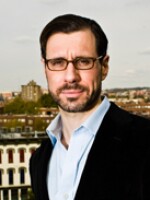RENEE MONTAGNE, host:
In Russia, the results of parliamentary elections were no surprise. And since President Vladimir Putin's party won in a landslide last Sunday, critics have said that authorities manipulated those elections to a shocking degree. They say Russia has become substantially more authoritarian as a result.
NPR's Gregory Feifer has talked to people around Moscow now that the vote has sunk in.
GREGORY FEIFER: Bilingua is a popular hangout for Moscow's bohemian artsy young crowd. Located in a trendy old neighborhood, the bar's large industrial-looking space includes a bookshop and hosts literary evenings.
You'd expect a lot of those here to be upset by reports of widespread fraud during last weekend's elections, but you'd be wrong.
Ms. KASHA KUTCHUSONIS (Museum curator): (Russian spoken)
FEIFER: Museum curator Kasha Kutchusonis(ph) says she didn't vote in the election because she believed the results were predictable, but she says she is not concerned about the lack of democracy in Russia.
Ms. KUTCHUSONIS (Museum curator): (Russian spoken)
FEIFER: Russia is stable, and it's on the right path, Kutchusonis says. And anyway, I'm not really interested in politics.
A couple tables away, 18-year-old student Alexi Aksandra(ph) says he voted for Putin's United Russia Party, which swept 70 percent of seats in the parliament.
Mr. ALEXI AKSANDRA (Student): (Russian spoken)
FEIFER: I was a little concerned about the cult of personality being built around Putin, he said, but I like the president's course. I mean he looks good on television and he's respected. Maybe there is a dictatorship in Russia, but I'm not worried about it.
But others are worried. Independent elections monitors reported systematic abuse of last Sunday's elections. They say the authorities harassed opposition campaigners, stuffed ballots, and forced state employees to vote for pro-Kremlin United Russia.
Across town from the Bilingua bar, some of the country's leading political observers gathered to make sense of the elections. The mood was decidedly grim. Grigory Satarov of the INDEM foundation said the authorities have revived Soviet-style control under which society is afraid to voice or vote for its own interests.
Mr. GRIGORY SATAROV (Information Science for Democracy Foundation): (Through translator) Public opinion in Russia no longer exists. People vote how they're expected; they say what they believe they're expected to say. If politics is a battlefield of competing interests, then Russia has no politics either. One group controls everything.
FEIFER: That's the group that runs the Kremlin and mostly includes former security service offices. Many believe that they ordered regional governors appointed by Putin to deliver a certain number of votes during the election, which they falsified.
In the troubled region of Chechnya, 99 percent of the electorate voted for United Russia. Dimitri Eraskian(ph) of the Mercator Group says the manipulation was so great it changed the nature of Russian's authoritarianism.
Mr. DIMITRI ERASKIAN: (Russian spoken)
FEIFER: And it will get worse. To deny the falsifications and pretend everything is normal it will be necessary to further clamp down against the opposition, independent media, and the Internet, to plug all the holes from which true information can flow.
Eraskian says Putin's power base resembles a feudal system of government.
Mr. ERASKIAN: (Through translator) Local elites are loyal to Putin's United Russia Party, and in return they're allowed to do whatever they want in their regions. But the Kremlin's increasing control over a massive country is leading toward a dead-end situation - the same that resulted in the Soviet collapse.
FEIFER: Analysts say last weekend's parliamentary elections were a warm-up for the presidential election next March when Putin is required to step down. Many believe he'll hold onto power, possibly by becoming prime minister, while selecting a weak figure to succeed him in the presidency.
Putin's United Russia Party is set to pick its presidential candidate in less than two weeks.
Gregory Feifer, NPR News, Moscow. Transcript provided by NPR, Copyright NPR.






